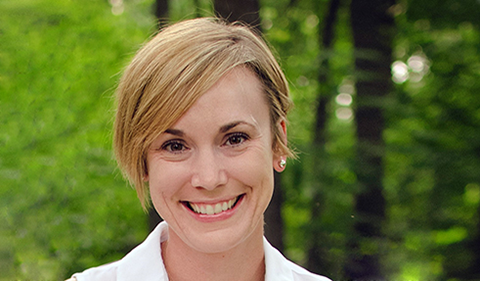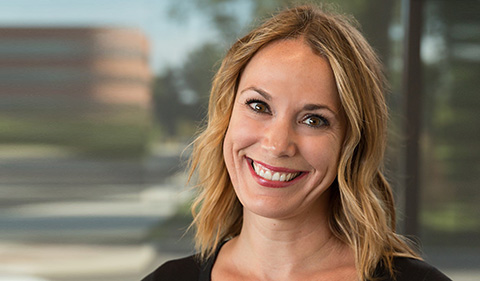Julie (Musick) Conrad ’04 never thought she could find herself in something like quality assurance, much less as a manager, without a business degree and for a while she regretted the major she picked and direction she went in college.
“If someone had told me this is where I would be post-collegiate with a Sociology-Criminology degree when I walked out of the Convo that Saturday in June, I would have told them they were insane,” says Conrad, now Quality Manager at JPMorgan Chase & Co. “However, knowing who I am, Sociology was and is the only degree that that fits me and in today’s world I would have to say it’s the most valuable degree you can have.”
She says that her college experience helped her to be a better person and that with that she can do whatever she wants.

Julie Conrad
Conrad graduated from Ohio University College of Arts and Sciences with a bachelor’s in Sociology/Criminology in June 2004 and drove out of Athens without a clue as to what was next. She had no job lined up and no clue what she wanted to do with the degree she had just spend four years working towards.
A few months later she started working for Northeast Ohio Community Alternative Program (NEOCAP), a residential facility for convicted, non-violent, felons with substance abuse issues. She worked as a Resident Supervisor in the female wing for most of her time there.
“Overall I really enjoyed my job and the interactions with the female residents. They ranged in age from teens to mid-fifties all from very different backgrounds.
“Unfortunately, like most social service-type jobs, the job became very consuming and as I learned more about how the system works – or in this case didn’t work – I realized that I couldn’t sustain a career in this line of work.”
She saw an ad in the newspaper (how archaic!) for a collections company and decided that she needed something at the opposite end of the spectrum from what she was doing.
“I started in collections in the spring of 2005 – the economy was stable and the unemployment rate low. During the first several years it was relatively easy to work with our customers and for the most part everyone I deal with just wanted to pay off their debt and never hear from us again!”
Then in the fall of 2008 the stuff hit the fan.
The mortgage crisis was in full swing and people started to lose their homes left and right. Trying to get someone to pay off a credit card from five years ago was a little more difficult when they’re losing their home – the credit card was no longer their priority, and rightfully so.
She says that’s when the conversations got hard and she had to draw upon her background and education.
“For the longest time I felt like I wasn’t using my degree as the years went by, but now as I sit back and reflect upon my early days at the collection agency I realize that I used my degree on a daily basis as I was working with clients and debtors to facilitate debt repayments and the like.
“I can’t really point to a specific method or ideology from my Sociology background that related directly to my interactions with these people but I have no doubt that I was drawing upon the vast amount of knowledge I gained through the combination of all of my Sociology courses.”
Conrad spent almost five years at this collections agency before landing a job at Chase Bank within the Business Banking organization, where she started with a job that was similar to the collections work she was doing at the time. The new part was that she was dealing with customers while they still had their loans with the bank, working with them on new payment arrangements so they could find their way out of default.
She spent two years in this role before moving on to an underwriting position – still working with loans that are in default, but now she was completing the financial analysis that would determine their new loan structure.
“This was in 2010 – housing market still in the tank, small business struggling to get by, and and people still fighting to save their homes.
“The bank was the enemy to most and it was our job, or should I say our responsibility, to let our customers know that we’re still here for them, we want to help and we’ll do the very best we can to make sure they can keep their doors open while still honoring their commitment to the bank.
“The regulators came down on the banks after the mortgage crises and I saw an opportunity to be part of a solution.”
Conrad moved over to Quality Assurance in the fall of 2013 – now working behind the scenes to ensure that the organization was in compliance with regulations and to identify potential gaps in high risk processes that require controls. She has been a part of Quality for Business Banking for the past three years and now manage a team of eight people.
“I love that every day is a challenge – between managing the production of my team and managing relationships we have with our business partners, I have to adapt throughout the day to most effectively communicate with the different people I work with.
“Critical thinking is a constant component of this role and I’m always being challenged to find a better way, a more efficient and effective way, to get the job done.”



















Comments